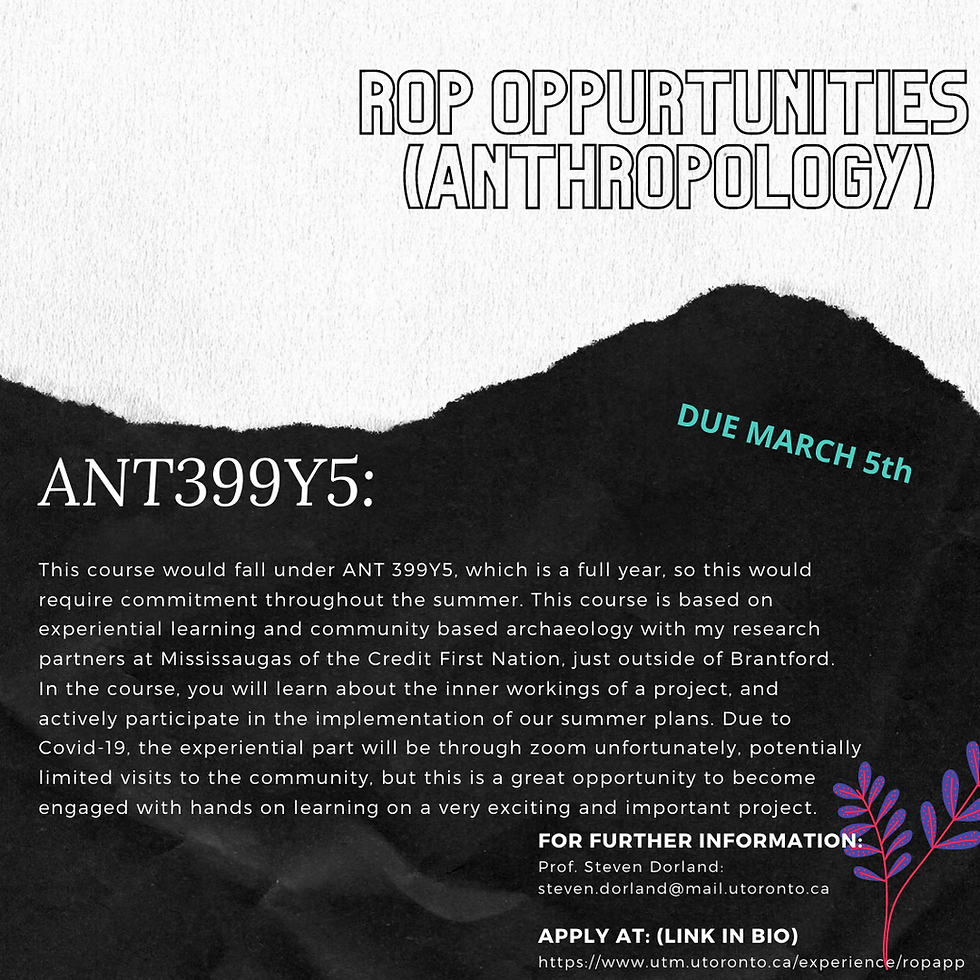ROP Opportunity: Learning Community Based Archaeology with Mississauga' of the Credit First Nation
- UTMAS

- Mar 5, 2021
- 3 min read
Check out this latest ROP opportunity posted by Dr. Steven Dorland:

Recently, there has been development and discussion in the archaeological community to grow archaeological applications that are based on community engagement. Through these approaches, Indigenous voice and perspectives are shared and centered, knowledge becomes democratized, and archaeologists develop ways to blend the needs and interests of Indigenous communities and the research goals of archaeologists. Through dialogue, negotiation, recognition of colonial histories, and ultimately respect, the number of community-based projects in north America have grown as academic institutions work to develop and strengthen relationships with local Indigenous communities. As a result, archaeologies become centered on establishing socially responsible approaches to learn about past and present lifeways.
The objective of this course is to develop skills and training regarding the development, organization, and implementation of a component of a community-based archaeology project working with an Indigenous community during the summer of 2021. To truly understand community-based archaeology in this context, students need to have hands-on engagement and interaction with project members and community partners. Based on COVID-19 precaution, there will be minimal visits to the community, as MCFN Council has limited non-community members from MCFN. However, we are planning on running a series of online workshops that students will help assist in organizing and implementing.
Currently I have a project in partnership with Councillor Veronica King-Jamieson and Dr. Jonathan Ferrier, the Director of the MCFN Board of Education and Awareness and Board Member respectively, and Dr. David G Smith of the Department of Anthropology. This project has been approved in October 2020. To best learn about community approaches, the students will have opportunities to engage with community members through different avenues and learn about Indigenous methodologies and ways of knowing. The basis of this project is developing an educational program with the MCFN Summer Youth Camp during the late summer, where participants will learn about learning pottery making through archaeology and community perspectives. We are providing opportunities for community youth to contribute to understanding of pottery production, as well as training youth transferable skills. As part of this project, the prospective student will engage in hands-on participation, through online and if possible in-person community engagement, to get real-life experience regarding the experience being involved in a community based project and engaging with community stake-holders.
Student participation will involve literature review on applications of community-based archaeology, direct involvement in the assistance of cultural events working with community members involved in the project and community partners. Students will work with community partners and myself to reach out to community partners. As part of this experience, students will keep a journal recording their experiences, and reflecting on challenges and opportunities associated with working with the MCFN Board of Education and Awareness. They will also have the opportunity to speak to project collaborators to learn and reflect about various ways of engaging with communities, and how to effectively address needs and interest of community members through such projects. Lastly, they will write a paper that brings together all they have learned that relates to the benefits and challenges of community-based archaeology with Indigenous communities.
Breakdown of student evaluation is as follows:
50% Participation and Involvement in community-based project, this will include interviews with project members to get acquire different perspectives regarding community based work
20 % Journal recoding progress and reflections through project
30 % essay on benefits and challenges associated with community-based research. This will be written as a co-authored paper, in which students will lay out their contributions to each section.
List of Skills required for Students
- Students will have to have an understanding about Indigenous communities and history relating to southern Ontario
- Students will need to be respectful and sensitive to cultural protocols associated with MCFN community events.
- Students will require strong organization and time management skills
- Students will require strong communication and interpersonal skills
- Students will need to work independently and in a team-based environment
- Students with experience engaging with community stake-holders is an asset
Course Requirements
ANT 241
Recommended but not required
ANT 317


Comments